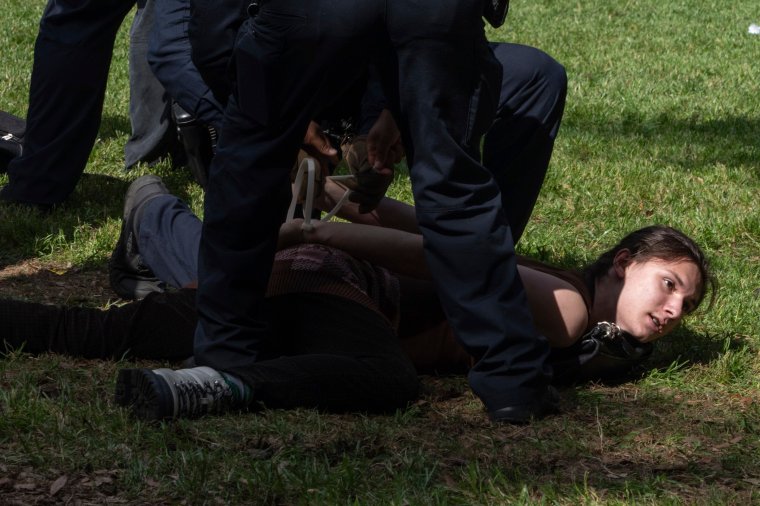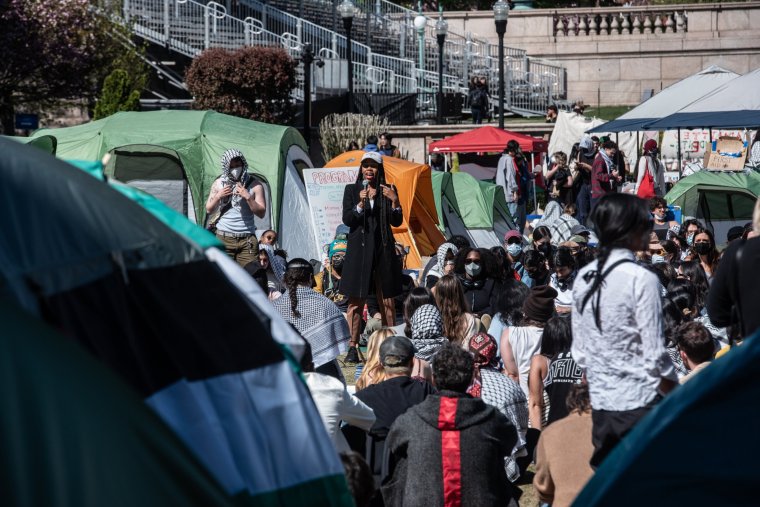Police used tear gas and tasers and made hundreds of arrests in a crackdown on pro-Palestine protest camps at US universities as the movement spreads across the country, with camps also formed in the UK, France, and Germany.
Students at dozens of universities including Harvard, Yale, MIT, and UCLA have established protest zones on campus over the past week in opposition to the war in Gaza, following the example of Columbia University where police carried out more than 100 arrests last week.
Activists at Warwick University announced the launch of a protest camp on Friday, stating “we rise up in unison with fellow students around the world”. Camps and barricades have also been formed at the Sorbonne University in Paris, while German police moved to clear a site in Berlin on Friday.
US police have launched raids on several camps, after university authorities said the demonstrations were unauthorised.
Videos from Emory University in Atlanta, Georgia, showed violent clashes between police and protesters on Thursday, with police using tasers and tear gas. Police acknowledged using “chemical irritants” to “control the unruly crowd”, and reported 28 arrests.
Students and journalists at Indiana University published photos on Friday of what they claimed were snipers on a roof overlooking a protest area at the Bloomington campus, which one student group described as an “unhinged response to a nonviolent encampment”. Thirty-three arrests were reported at the university.
Indiana University referred enquiries to Indiana State Police, which had not responded at the time of writing. The police later told local media that the armed personnel were their officers but did not say in what capacity.
Indiana House Democrats released a statement state criticising the university for inviting onto campus “state police with military-style weapons that included what appeared to be snipers stationed on rooftops” and accused administrators of a “textbook violation of the First Amendment” for seeking to shut down the protest.
The American Association of University Professors also condemned the heavy-handed policing at Indiana University in a statement alleging a “sniper with high powered weapon was placed on the Indiana Memorial Union roof”.

Police also made dozens of arrests at a protest at the University of Texas at Austin earlier this week, with clips showing officers charging the crowd on horseback.
The University of South California closed its campus and cancelled the annual graduation ceremony after police broke up a protest and made 93 arrests.
More than 500 pro-Palestine activists have been arrested this week in total, according to a tally by Reuters, from at least 11 universities.
The camps trace their origin to Columbia University in New York City, site of long running and contentious protests, where university president Minouche Shafik called police last week to clear a camp, which was swiftly re-established.
Students at dozens of other universities organised to follow Columbia’s example, networking through Zoom calls, a process spurred on by the spectacle of police storming Columbia’s Manhattan campus.
“We’re standing here today because we’re inspired by the students at Columbia, who we consider to be the heart of the student movement,” said Malak Afaneh, a law student and spokesperson for a protest camp at the University of California, Berkeley, on Tuesday.
“We talked about what it was like to recruit people and join, and what it meant to stand in solidarity together, and what it would look like if these camps started popping up everywhere,” Soph Askanase, 21-year-old Columbia student who was arrested last week, told the Washington Post.
Students at Columbia and several other universities say they are protesting not only at the war in Gaza and US support for Israel, but also their institutions’ ties to Israeli universities and investments in companies perceived to be complicit in Israeli actions.
Administrators and students at Columbia have been in negotiations for days with the university setting and revising a series of deadlines to clear the camp. The atmosphere at the Ivy League university remains febrile with pro-Palestine and pro-Israel protesters clashing outside the campus on Thursday night.
Some Jewish groups and US officials have accused the Columbia camp of promoting terrorism and antisemitism, citing clips of activists singing offensive songs such as “Burn Tel Aviv”. Organisers say the protest is peaceful and has a large Jewish presence, and argue that most of the offensive clips were filmed outside the university.
Republican House speaker Mike Johnson visited Columbia on Wednesday and called for a crackdown.
“We just can’t allow this kind of hatred and antisemitism to flourish on our campuses… Those who are perpetrating this violence should be arrested,” he said to boos from a crowd of students.
US education secretary Miguel Cardona said on Thursday his department was closely monitoring the protests, including what he described as “very alarming reports of antisemitism.”


Israeli officials have excoriated the protests. “Antisemitic mobs have taken over leading universities,” Prime Minister Benjamin Netanyahu said on Wednesday. “It has to be stopped.”
Israel’s far-right National Security Minister Itamar Ben Gvir said he was creating emergency security teams to protect Jews abroad in response to the campus protests.
“I asked the police commissioner to draft a plan to aid in the creation of local response teams that will protect Jewish communities and institutions overseas,” he said.
Amnesty International, Human Rights Watch and the American Civil Liberties Union (ACLU) have condemned the arrests of students and called for the right to protest to be respected.
“Robust debate and a fierce desire to engage with global events have long been at the centre of academic life in America’s public universities,” said Deepinder Mayell of ACLU Minnesota. “This free exchange of ideas… is a fundamental principle of any healthy democracy.
“Students and faculty at public universities who express political opinions, criticise foreign governments, or speak out in favour of any cause or movement have a First Amendment right to express themselves.”
Professor David Cortright, a historian of social movements at the University of Notre Dame in Indiana, US, said the Palestine camps have echoes of some of the largest protest movements in US history.
“During the Vietnam movement, young people also led the way,” he said. “Students for a Democratic Society (SDS) sponsored the very first demonstration against the Vietnam War in front of the White House in April 1965. SDS chapters appeared at campuses all over the US during the 1960s and sparked many protest actions.”
“The movement today against Israel’s war in Gaza is similar. Protests are spreading to many campuses… If Israel’s war continues and civilian suffering in Gaza worsens, we will see the movement grow even larger. It could begin to match the scale of the protests during the Vietnam era.”
The tent camps are also “following the model of the anti-Apartheid and Occupy Wall Street movements,” Dr Cortright added. “During the anti-apartheid movement in the 1980s, students at many universities erected ‘shanty towns’ on their campuses, evoking the dismal housing conditions Africans experienced in Soweto and other South African ghettoes.”


